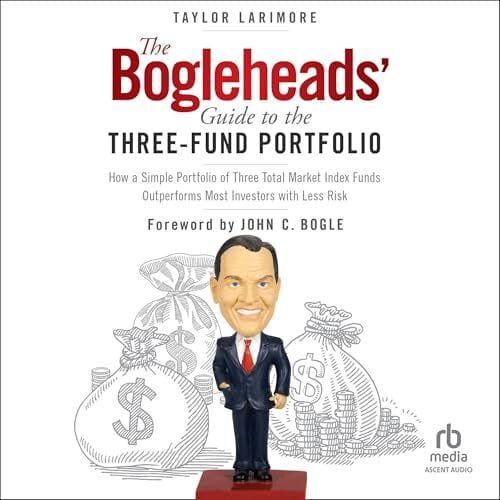- BeanWealth
- Posts
- The 3-Fund Secret to Retire Rich
The 3-Fund Secret to Retire Rich
How Jack Bogle changed investing forever
Good Evening! 👋
Welcome to Wealth Wednesday! Most people have no idea how simple retirement investing can be. This will show you a legends plan!
Join over 4 million Americans who start their day with 1440 – your daily digest for unbiased, fact-centric news. From politics to sports, we cover it all by analyzing over 100 sources. Our concise, 5-minute read lands in your inbox each morning at no cost. Experience news without the noise; let 1440 help you make up your own mind. Sign up now and invite your friends and family to be part of the informed.
Dear Investor,
The Man Who Made Retirement Simple
I’ve spent years studying the best investors of all time, and very few shaped the way everyday people invest for retirement quite like Jack Bogle. While many investors were chasing hot stocks and trying to beat the market, Bogle focused on a radically different idea: own the market instead.
By creating the first index fund for individual investors, he made it possible for millions of people to build wealth without needing to time the market or pick winning stocks.
Bogle’s approach was grounded in three simple ideas: keep costs low, diversify broadly, and invest for the long haul. That philosophy gave rise to what is now known as the “three-fund portfolio,” a simple yet powerful retirement strategy centered on total market index funds.
And while the financial world has changed dramatically over the years, Bogle’s principles remain as effective today as they were when he first launched the Vanguard 500 Index Fund in 1976.
In this edition of Wealth Wednesday, I’ll walk you through Bogle’s investing philosophy, the logic behind the three-fund portfolio, and why his ideas continue to stand the test of time.
Who Was Jack Bogle?
John “Jack” Bogle was the founder of Vanguard and the father of index fund investing. But more than that, he was an investor who truly believed in helping everyday people build long-term wealth through cost-effective and straightforward strategies.
While Wall Street was focused on complex products, short-term trading, and high fees, Bogle had a different vision. He believed most mutual fund managers couldn’t consistently beat the market over time, so instead of trying to outsmart the system, he encouraged investors to own the entire market through index funds.
When he launched the first index mutual fund for retail investors in 1976, many people thought it was a joke.
It was even called “Bogle’s Folly” by critics. However, over the years, it has proven to be one of the most essential innovations in the investment world. Index funds have now grown into a multi-trillion-dollar industry, and the concept that Bogle pushed forward has helped millions of people retire more comfortably.

Bogle didn’t care about headlines, flashy stock picks, or chasing trends. He focused on compounding, reducing costs, and staying invested for the long haul. He was never afraid to say what most of the financial world wouldn’t.
In his view, lower fees and long-term simplicity were the most powerful tools available to the average investor. And in many ways, time has proven him right.
The 3-Fund Portfolio
One of the most potent strategies Jack Bogle popularized was so simple that many investors overlook it.
It’s called the 3-fund portfolio.
At its core, this strategy is about owning the entire market through just three low-cost Vanguard index funds:
A U.S. total stock market index fund
Example: Vanguard Total Stock Market Index Fund (VTSAX or ETF version VTI)
What you get: Exposure to over 3,500 U.S. companies across all sizes and sectors. That includes the giants like Apple, Microsoft, Amazon, Nvidia, and even smaller firms you’ve never heard of.
Why it matters: You’re betting on the long-term growth of the U.S. economy, without trying to pick winners.
An international stock market index fund
Example: Vanguard Total International Stock Index Fund (VTIAX or ETF version VXUS)
What you get: Ownership in 7,000+ companies outside the U.S., including names like Nestlé (Switzerland), Samsung (South Korea), Toyota (Japan), and ASML (Netherlands).
Why it matters: The U.S. doesn’t own all the future. Adding international stocks gives your portfolio true global diversification. You’re investing in the global economy, not just Wall Street.
A U.S. total bond market index fund
Example: Vanguard Total Bond Market Index Fund (VBTLX or ETF version BND)
What you get: A mix of U.S. government bonds, mortgage-backed securities, and high-quality corporate debt.
Why it matters: Bonds add safety and predictability. They smooth out the ride when stocks get rocky and become increasingly important as you near retirement.
The real power of this strategy is in its simplicity.
You don’t need to guess which sector will outperform next year or jump in and out of the market. You’re investing in everything, all at once.
Even better? You can tailor the allocation based on your risk tolerance or age:
In your 20s or 30s: You might go 90% stocks (60% U.S., 30% international) and 10% bonds.
In your 50s or 60s: You might shift to 60% stocks and 40% bonds.
In retirement: You may prioritize income and capital preservation, with a heavier bond allocation.

It’s boring. It’s predictable. And that’s precisely why it works.
Why Bogle’s Philosophy Still Wins
In a world obsessed with beating the market, Bogle’s message feels like a quiet rebellion.
He didn’t believe in chasing trends or timing the perfect entry. He believed in owning the market at the lowest possible cost, holding it for the long term, and letting compounding do its job.
It’s a strategy that requires patience and discipline. But it works. Over time, most actively managed funds tend to underperform index funds, especially after accounting for fees. Meanwhile, the simplicity of Bogle’s approach prevents investors from making emotional mistakes, such as panic-selling during a crash or jumping into hyped stocks at their peak.
That’s the brilliance of it. No complicated formulas or constant portfolio tinkering. Just a steady, boring plan that quietly builds wealth in the background.
For anyone trying to retire with confidence, it’s hard to beat what Jack Bogle gave us.
He didn’t just create index funds.
He gave the everyday investor a shot.
SUGGESTIONS
Poll
If you have any questions or feedback or just wanna say hey, simply reply to this email.
See you on Sunday!
Matt Allen

Disclaimer for BeanWealth
BeanWealth is a publisher of financial education and information. We are not an investment advisor and do not provide personalized investment advice or recommendations tailored to any individual's financial situation. The content provided through our website, newsletters, and any other materials is for educational purposes only and should not be construed as financial or investment advice.
All information is provided “as is,” without warranty of any kind. BeanWealth makes no representations or guarantees regarding the accuracy, completeness, or timeliness of the information presented. The opinions and views expressed in our content are those of the author(s) and do not necessarily reflect the views of BeanWealth, its partners, or its affiliates.
Investors should perform their own due diligence and consult with a professional financial advisor before making any investment decisions. None of the information provided herein constitutes a solicitation to buy or sell any securities or financial instruments. Any projections or forecasts mentioned are speculative and subject to risks and uncertainties that could cause actual outcomes to differ.
BeanWealth, its employees, and affiliates may hold positions (long or short) in the securities or companies mentioned, and these positions may change without notice. No guarantees are made regarding the continuation of these positions.
Forward-looking statements, estimates, or forecasts provided are inherently uncertain and based on assumptions that may not occur. Other unforeseen factors may arise that could materially affect the actual outcomes or performance of the securities discussed. BeanWealth has no obligation to update or correct any information after the date of publication.
BeanWealth disclaims any liability for losses or damages, whether direct or indirect, resulting from the use of the information provided. By accessing or using any BeanWealth content, you agree to this disclaimer and our terms of service.
Unauthorized distribution, reproduction, or sharing of this content is strictly prohibited and subject to legal action.

